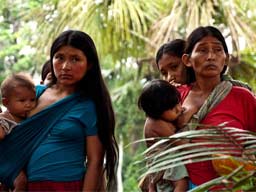Reform International Financial Institutions
Mega-projects – such as dams, road and waterway systems, and oil and gas projects – are major drivers of deforestation in the Amazon Basin. These large-scale projects require large-scale funding, and international financial institutions (IFIs) step into to fill that role. For decades, the World Bank, the Inter-American Development Bank (IDB) or an export credit agencies such as the U.S. Export Import Bank were the principle players in backing big projects in South America. Recently however, regional actors including Brazil's National Bank for Economic and Social Development (BNDES) and the Andean Development Corporation (CAF) are playing an increasing role in funding mega-infrastructure projects. With billions of dollars in loans going to environmentally devastating projects, the growing investments by regional banks is especially alarming given their lack of transparency and accountability, and weak enforcement of environmental and social safeguards.
Amazonian indigenous peoples and traditional communities, whose lands lay in the path of these development projects, are profoundly affected by their construction. Yet, their perspectives are rarely if ever considered relevant to project planning, approval and financing. In response to this situation and to the accelerating pace of development, Amazon Watch is working with community organizations and NGOs at the local, national and international levels to defend the rights of impacted by IFIs-supported development projects.
Mega-projects and IFI Policies
Over the decades, International Financial Institutions (IFIs) have followed a model of mega-project development in fragile environments, imposed with little regard for international human rights, particularly the right to free prior and informed consent. Several emblematic projects have gone forward in the Amazon basin in recent years such as Camisea Gas Project in Peru, the Brazil-Bolivia pipeline, and the Belo Monte Dam in Brazil currently underway. These projects have resulted in substantial environmental impacts such as deforestation and pollution while also violating the local peoples’ rights. Fortunately, international campaigns to stop IFI funding of destructive projects has resulted in some important changes to IFI social and environmental policies.
As a new wave of development projects are cued up in South America, there is an urgent need for a new round of braoder IFI policy reforms, with special attention to the IDB which is responsible for a number of harmful projects in the Amazon through IIRSA. The G-20 has recently agreed to re-capitalize the multilateral banks conditioned on a series of reforms. Some of these conditions open the door to new policies around climate change, renewable energies and environmental and social safeguards, as well as new structural changes to ensure stronger planning, accountability and access to information.
The G-20 conditions could be good news. However, despite the public commitments of governments and the United Nations to address global issues such climate change and sustainable development, the IFIs have not moved far beyond the devastating policies of the 1980s, focused on the promotion of extractive industries and export of primary products. Those polices have served Northern markets and created pockets of wealth in targeted countries, but have simultaneously generated widespread environmental destruction in the Amazon along with social conflict, inequality and corruption.
New Financial Actors; New Challenges
The governments and companies behind projects such as the Initiative for Integration of Regional Infrastructure in South America (IIRSA), a pan-regional development blueprint of over 500 infrastructure projects based on an export-oriented development model, are increasingly turning to regional financial institutions such as BNDES, CAF and in some cases Chinese investors to back the projects. With these new players come new challenges. These banks bring many of the traditional vices of the IFIs – focus on financial returns without a wider calculation of environmental and social costs – but without the public access to debate sustainability, human rights or accountability. These new entrants threaten to undermine the gains made over many decades with traditional IFIs through a “race to the bottom” to invest with minimal conditions. Amazon Watch and others have broadened their focus to tackle this new threat. To that end, Amazon Watch is seeking to strengthen networks with civil society groups in key countries to challenge the destructive policies of these banks.
The Role of Multilateral Banks
Multilateral banks, those banks funded and controlled by governments, have an inordinate influence on development in the Amazon. In exchange for favorable lending rates, political support and technical assistance, they often demand compliance with deep structural reforms carrying negative environmental and social consequences, such as mega-projects in the Amazon basin. These IFIs also provide critical capital and political legitimacy to private companies implementing the projects, and therefore hold influence over these projects that goes beyond their financial investments.
As public institutions, these banks seek more than narrow financial returns. They are responsible for promoting the broader political policies of the controlling government(s), and are accountable to the citizens of those countries. This relationship provides room to engage these banks on sustainability practices in the Amazon. The work of community and non-governmental organizations has resulted in important bank reforms and new policies around indigenous rights and sustainability.
Related Work:
Stop the Belo Monte Monster Dam
The Brazilian government is moving ahead "at any cost" with plans to build the third-largest dam in the world and one of the Amazon's most controversial development projects – the Belo Monte dam on the Xingu River.
IIRSA and the Manta-Manaus Corridor
The Initiative for the Integration of Regional Infrastructure in South America (IIRSA) is a throw-back to the days of big development schemes and the dreams of southern country governments (and northern lending institutions) for the energy, infrastructure, and communications integration of South America.



